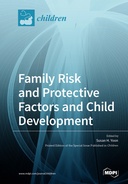Explore

Family Risk and Protective Factors and Child Development
0 Ungluers have
Faved this Work
Login to Fave
This reprint is devoted to understanding the unique and combined effects of family risk and protective factors on child development across multiple dimensions of functioning (e.g., physical, mental, emotional, behavioral, social, and cognitive).
This book is included in DOAB.
Why read this book? Have your say.
You must be logged in to comment.
Rights Information
Are you the author or publisher of this work? If so, you can claim it as yours by registering as an Unglue.it rights holder.Downloads
This work has been downloaded 71 times via unglue.it ebook links.
- 71 - pdf (CC BY) at Unglue.it.
Keywords
- abuse
- ACEs
- Activation
- adaptive functioning
- Adolescence
- Adolescent
- adolescent flourishing
- Adolescents
- arrests
- Attachment
- behavior problems
- black youth
- Child development
- child flourishing
- child maltreatment
- children media use
- cognitive functioning
- community violence
- conduct problems
- coparenting support
- COVID-19
- early development
- educational functioning
- Emotion Regulation
- Employment
- eudaimonic factors
- Exploration
- externalizing mental health
- externalizing problems
- Families
- family adversity
- family resilience
- father involvement
- Fathers
- foster care
- gadget
- Healthcare
- hedonic factors
- HIV
- household challenges
- internalizing problems
- internalizing symptoms
- intimate partner violence
- latent profile analysis
- life satisfaction
- majority world
- Mental health
- minority world
- mobile device
- moderated mediation
- Mothers
- MSM
- multisystemic resilience
- n/a
- neglect
- neighborhood social cohesion
- Neighborhoods
- parent attitude
- parent media use
- parental engagement
- parental physical abuse
- parental stress
- parenting style
- parents’ relationship
- path analysis
- peer acceptance
- peer rejection
- peer status
- physical neighborhood environments
- Popularity
- positive parenting
- positivity
- PRAMS
- pre-birth
- PrEP
- protective factors
- Psychology
- psychotic-like experiences
- Qualitative research
- Reading
- relationships
- resilience
- risk and protective factors
- school readiness
- social functioning
- Social Support
- Society & Social Sciences
- socioemotional development
- socioemotional functioning
- socioemotional problems and skills
- stigma
- Suicide
- violence resilience
- wellbeing
- Young Adult
- young children
- Youth
Links
DOI: 10.3390/books978-3-0365-5435-8Editions

